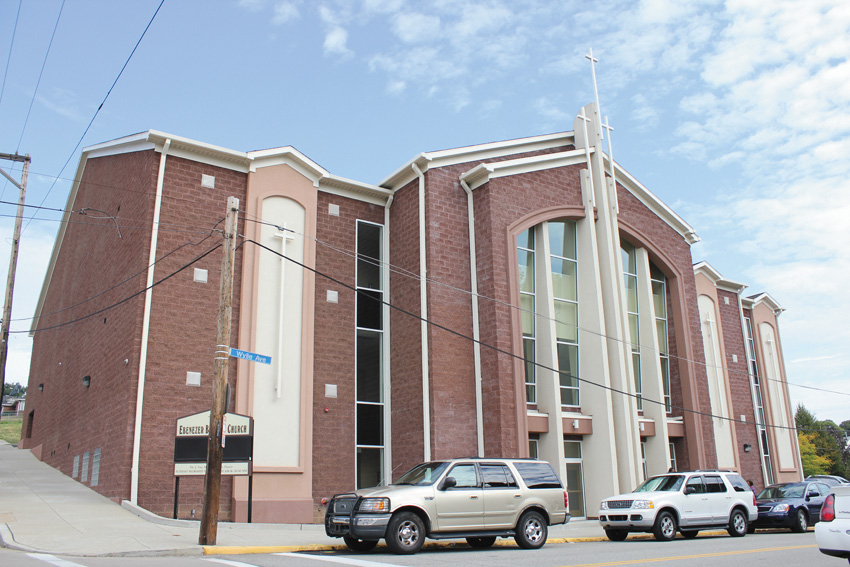In a recent New Pittsburgh Courier article, Pittsburgh Police Chief Nate Harper challenged Pittsburgh’s religious leaders to address violence in the Black community. He said the density of African-American churches in neighborhoods troubled by crime and violence should serve as a catalyst in deterring these problems.
| EBENEZER BAPTIST CHURCH—With “a church on every corner,” Chief Nate Harper challenged religious leaders to address the ongoing violence. (Photo by J.L. Martello.) |
In an effort to get a response from a variety of religious denominations, the Courier contacted approximately 15 religious institutions. It was difficult to get representatives from every denomination because Allegheny Alliance, Covenant Church of Pittsburgh, Pentecostal Temple COGIC, Macedonia Baptist Church, Kingdom Hall of Jehovah’s Witnesses and Bishop Donald Clay of Petra International Ministries did not respond to several requests for comment. Those who did respond said their churches and religious organizations were engaged in preemptive measures geared toward youths in order to stem the tide of Black-on-Black crime.
“We’re going to get behind (Chief Harper),” said Rev. James Edward Murray Jr., leader of St. James AME. “The church must bear the moral compass of the community. We must set the example that others must follow. So we must be at the front ensuring our young men and young women make the proper decisions in their lives.”
St. James spearheads its youth outreach through mentoring programs aimed at African-American males such as Cub Scouts and Boy Scouts as well as another program focused on academics and career success.
“If the men get behind this it makes a statement to the community. We insist that you know specifically where you’re going,” Murray said. “One of our young men was a top graduate, had a scholarship to Penn State and it was because of the guidance of the men in our church community.”
Although other church leaders explained how they were doing their part to help reduce violence in their communities, they were also offended by accusations that the church does not do enough to address this issue.
“I think we are unjustly criticized when we are looked at by people in the community. They often have a knee-jerk reaction. Something happens and they say where is the church,” said Rev. J.V. Alfred Winsett, pastor of Ebenezer Baptist Church. “If there’s anybody who feels that the Black Church has not addressed not only Black-on Black violence but violence in general, the Church has been very proactive.
“The Church is not only reacting, but has taken an active role in trying to develop programs for young people, giving them correct guidance so they can take their place in society,” Winsett said. “Programs for young people are something that has been around for years. We have a lot of success stories. The Black Church and I say those with the resources are engaged in programs on a daily basis.”
Encompassing many different religious organizations across Pittsburgh is the Pittsburgh Interfaith Impact Network, which includes Wesley Center AMEZ, St. Charles Lwanga Catholic Church, Grace Memorial Presbyterian Church and the Islamic Center of Pittsburgh. Though many of their campaigns do not address Black-on-Black violence or crime, the organization led by Rev. John Welch, did make an effort to target drug activity around St. Charles Lwanga as part of their Holy Ground Campaign last year.
Taking his church’s outreach efforts a step further, presiding elder of AMEZ Pittsburgh District, Rev. Glenn Grayson, who is also the pastor of Wesley Center AMEZ, has taken on the role of executive director of the Center that C.A.R.E.S, which offers children and adult educational and recreational activities.
“I concur that (the violence) needs to be addressed. I’ve buried several young people who’ve lost their lives through Black-on-Black crime. Personally we continue to do outreach and prevention,” Grayson said. “For 10 years we’ve been operating the Center that C.A.R.E.S. Our model is (kindergarten) through college. Serving that many kids through our programs, everyone is connected to someone who’s been affected by violence.”
Similar to Wesley Center AMEZ, Mt. Ararat Baptist Church, led by Rev. Dr. William Curtis, runs the Mt. Ararat Community Activity Center. Another element of their outreach is the Mt. Ararat Counseling Center that addresses depression, stress, abuse, alcohol and substance abuse, and crisis support.
Earlier this month, the Mt. Ararat Counseling Ministry presented the workshop “How Children Grieve,” looking at how children deal with loss. It took the angle of examining how adults and caregivers tend to minimize their grief or ignore it all together.
